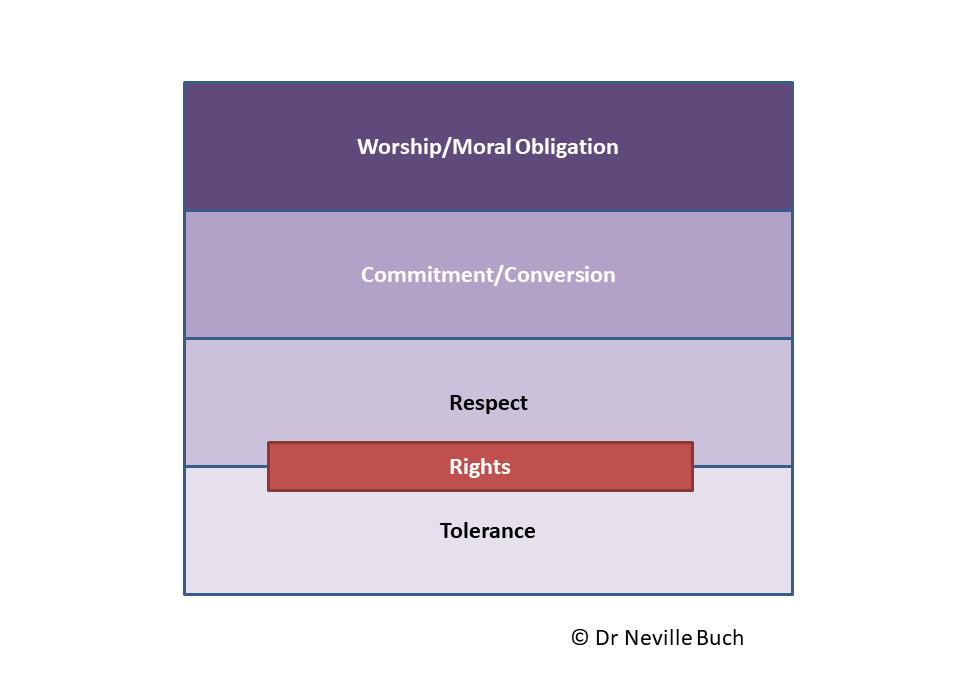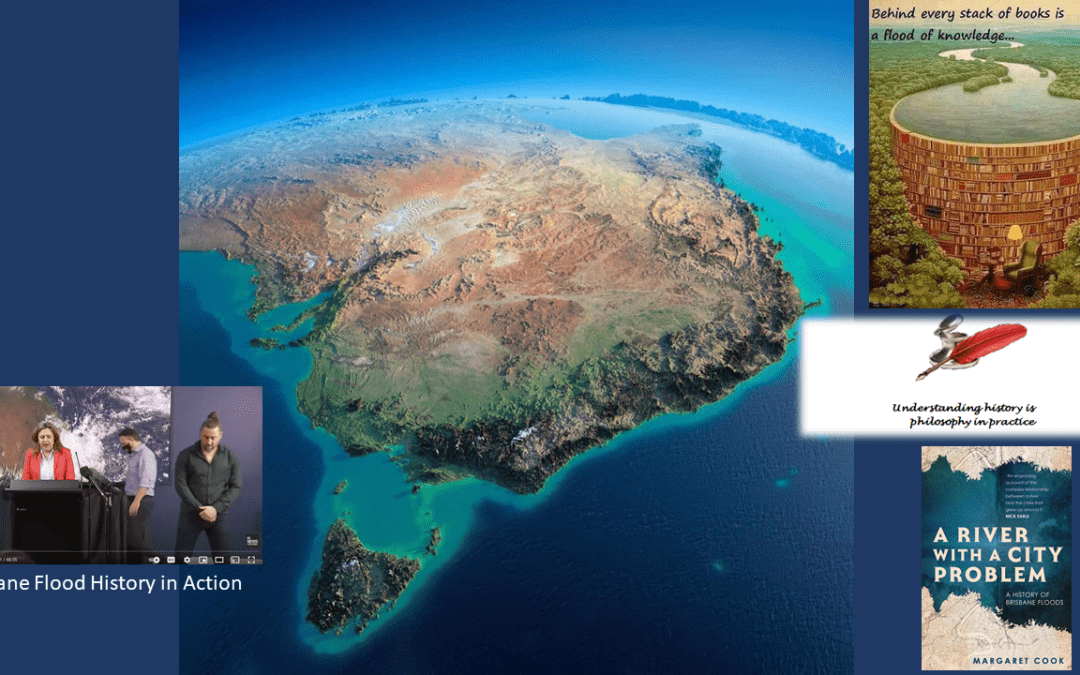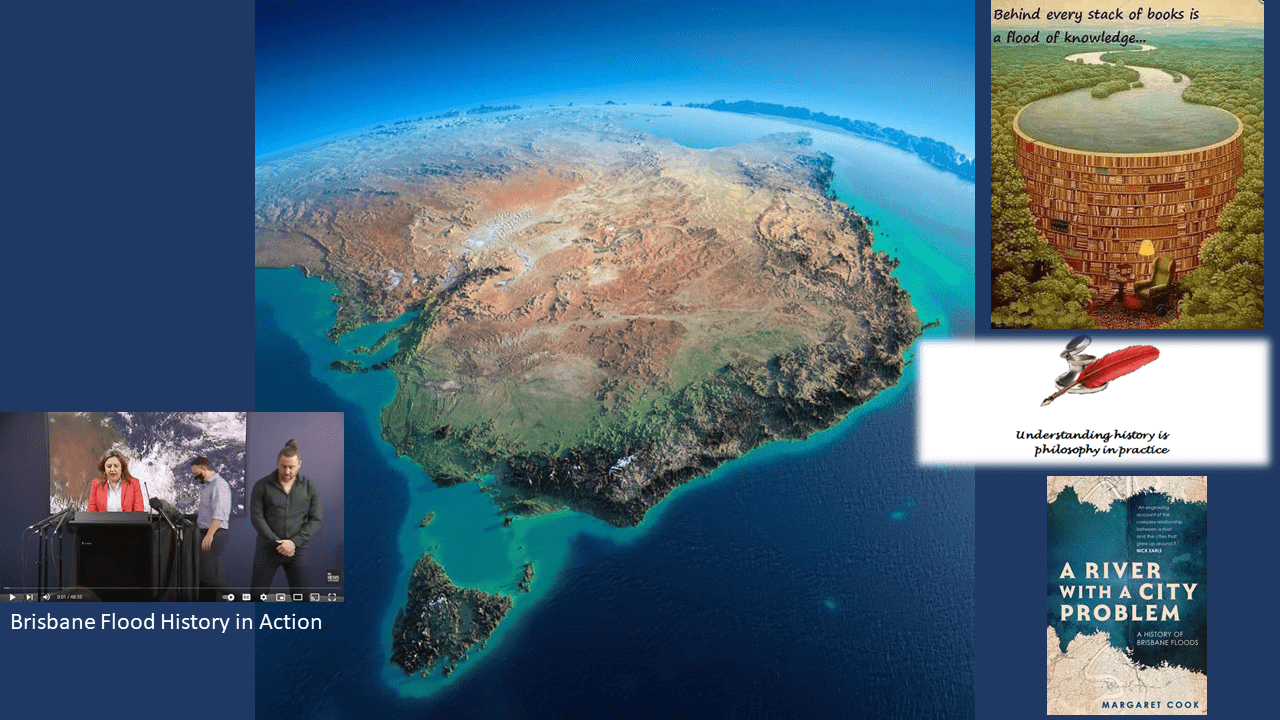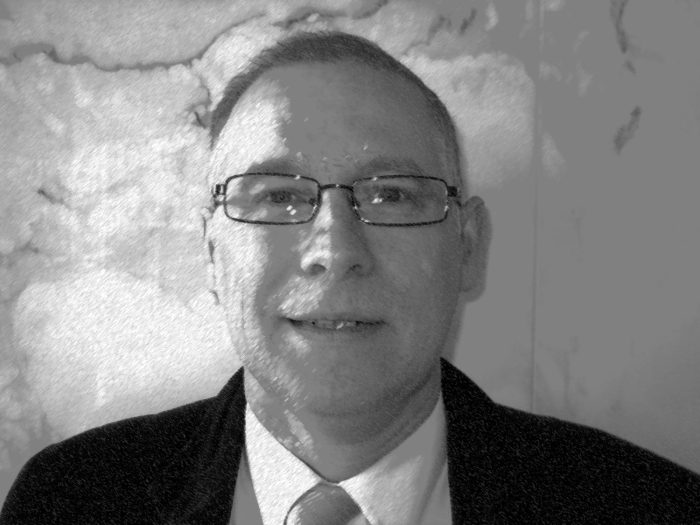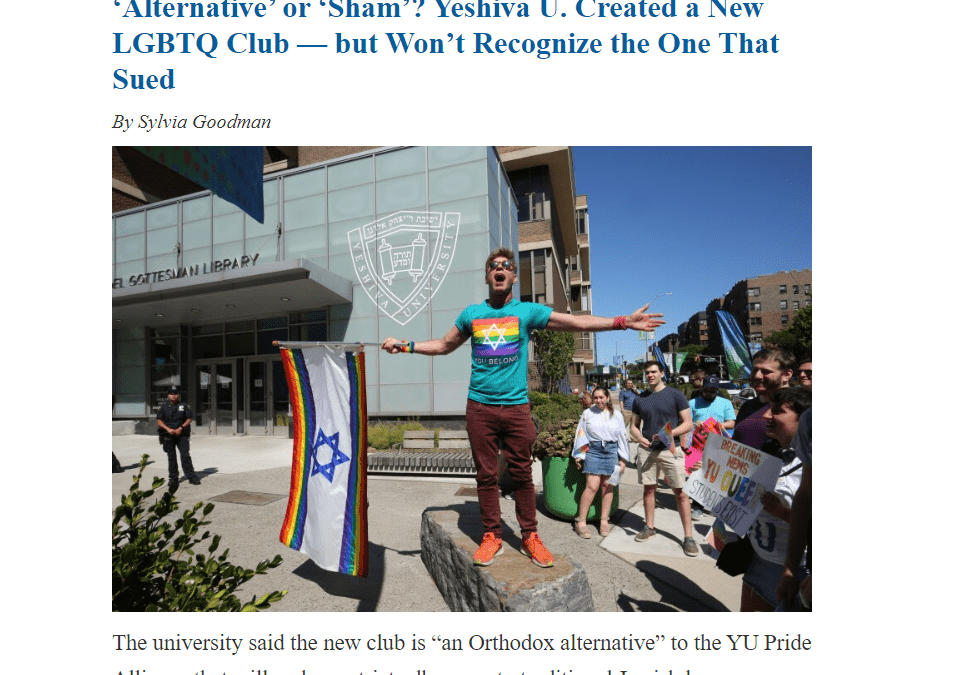
by Neville Buch | Oct 26, 2022 | Article, Blog, Concepts in Educationalist Thought Series, Concepts in Public History for Marketplace Dialogue, Concepts in Religious Thought Series, Intellectual History
Introduction
Today, we hear stories of Orthodox Judaism, and in this recent article from The Chronicle of Higher Education, we learn that ‘new orthodoxy’ is a ‘thing’.
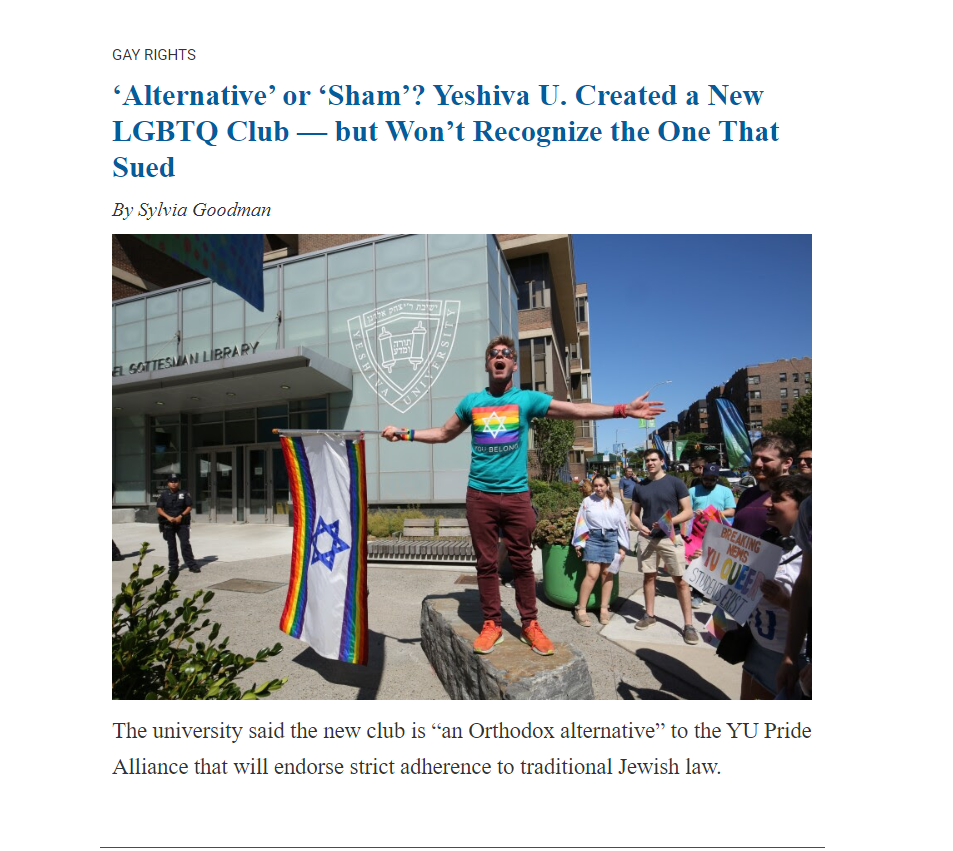
Image: Online story, Sylvia Goodman. ‘Alternative’ or ‘Sham’? Yeshiva U. Created a New LGBTQ Club — but Won’t Recognize the One That Sued, The Chronicle of Higher Education, October 24, 2022.
Dogmatists have been great at denying ‘new orthodoxy’ as a ‘thing’ since the claim brings modification to ‘correct belief’, creating incorrect belief; according to the dogmatists. However, the existence of many ‘new orthodoxies’ proposes an inescapable problem, for the dogmatist. The problem here is not confided to Orthodox Judaism, or even western religions, but any belief system which attempts to avoid admitting systemic error.
The focus here, for the concept of a new orthodoxy or neo-orthodoxy, goes to the worldviews of the Protestant and Catholic schemas, including secular expressions. So, the paper/article/blog (is there a difference today?) puts aside Orthodox Judaism and the Orthodox Christian traditions for obvious reasons, that ‘new orthodoxy’ is intellectually denied. Islam is too complex a story for orthodoxy and lies outside the specialist work of the author. In any case of ‘other religions’ and their schemas, it may well be the case that in ‘other religion’ new orthodoxies exist. The author argues that in the last few centuries the creation of new orthodoxies had come from the evolution in Protestant thought. The key understanding is the three Broad Academic Schools in Studies of Religion and 14 Academic Schools in the Philosophy of Religion
Three Broad Academic Schools in Studies of Religion and 14 Academic Schools in the Philosophy of Religion
The three main academic schools are:
1. That which centred on a general theory of religion developed by Rudolph Otto (1869 – 1937) and then later by Paul Tillich (1886 – 1965). The school had universal thought towards ‘religion’ and it is what began the larger enterprise of the academic studies of (or in) religion. The distinction between ‘academic studies’ and education broadly is made below.
2. That which centred on phenomenon, in opposition to a general theory. It was known as phenomenology of religion and developed by Mircea Eliade (1907 – 1986) but the concepts applied were generated from the leading phenomenologists and existentialists, and in particular, Edmund Husserl (1859 – 1938) and Martin Heidegger (1889 – 1976). In this regard, Paul Tillich’s ‘ultimate concern’ becomes phenomenological. This is a movement in the academic studies that predominated in the mid-twentieth century. It, nevertheless, coexisted with the education of the general theory, and arguably would not have existed without it.
3. That which centred on cultural pluralism. This is particularly the British school of Ninian Smart (1927 – 2001; Lancaster University) and John Hull (1935 – 2015; Birmingham University) in the academic studies, but a fair number of American and British philosophers of religion have been particularly important in the education: Huston Smith (Why Religion Matters, 2001) and Don Cupitt (After God: The Future of Religion, 1997) are significant. The school of ‘religious’ thinking came late; in the last few decades of the twentieth century, and is now predominant in the early 21st century. The school conjoins the phenomenological concern as cultural pluralism and the deeper skepticism of the fourth school emerges from the work of Fitzgerald and McCutcheon which focuses on the conceptual challenges of cultural pluralism.
All together the scholars across the academic studies are known as ‘religionists’. Before looking closely at the three main schools, religionists need to be distinguished with ‘religious educators’. There is a separate academic field of education which is also concerned with the academic studies of religion, but concerned with marrying these theories and concepts of religion to those of educational studies. In this regard, a few more scholars also have to be examined in relation to the Queensland history. John Dewey (1859 – 1952) was a very well-known broad educator whose views on ‘religion’ were very influential among American educators of religion. Dewey’s general theory was A Common Faith (1934), a humanistic study of religion originally delivered as the Dwight H. Terry Lectureship at Yale University. Influencing Dewey and other educators on religion was William James (1842 – 1910). James’ ‘The Will to Believe’, a lecture first published in 1896 is seminal. It brought ideas of Personal Idealism (George Holmes Howison 1834 – 1916) and of Personalism (F. C. S. Schiller 1864 – 1937) into the arrangement of American Pragmatism. Other major influences in the American Religious Education movement were Eric Erikson (1902 – 1994) for his work in the psychology of religion, and Charles Hartshorne (1897 – 2000) for his work in process philosophy. The institutions and persons in the American Religious Education movement will be considered further on.
The 14 Theological Directions from Studies of Religion and Wider Consideration of the Philosophy of Religion
The philosophic thinking has streamed between 30 to 40 theological directions and taken aboard wider consideration of contemporary philosophy of religion than what has generally been recognised in academic theological discourse in relation to the curriculum, but nevertheless has representation in 20th century education for belief and doubt, including formal programs of religious education or Christian education. Seeing how philosophical thinking streams and overlaps into the diverse theological directions, which are represented in educational programs, better provides the wide range of the educational discourse. Ranging from the earliest shift in Christian thought, following from the conventional to the less popular or less known programs, the schools of thought can range from the German Neo-Orthodox Stream to the Anglo-American Atheist-Deist Stream. At this point of the research, the focus is the scoping of Protestant Thought, bearing in mind that innovations in Catholic thought and the continuing non-innovation from the Orthodox tradition will also need to be considered. Furthermore, there are often officially-unstated influences between the three Christian broad traditions. For this reason, Catholic ‘theologians’ who are influential in Queensland, a state where Catholic thought overlapped into the thinking of broad ‘Protestant’ institutions, have to be noted. The following might not be a comprehensive listing of the theological or atheological streams, but the list is extensive and includes all major players who informed religious/Christian education:
- German Neo-Orthodox Stream – Liberal Neo-Orthodoxy
Karl Barth
Dietrich Bonhoeffer
Jürgen Moltmann
| Catholic ‘Theologian’ |
Tradition |
| Karl Rahner |
Nouvelle théologie; Transcendental Thomism |
| Romano Guardini |
|
| Joseph Ratzinger (Pope Benedict XVI) |
|
- European Reformed ‘Neo-Orthodox’ Stream – Liberal Neo-Orthodoxy
Emil Brunner
| Catholic ‘Theologian’ |
Tradition |
| Edward Schillebeeckx |
Dominican |
- German ‘Neo-Orthodox-Process’ Stream – Liberal Neo-Orthodoxy
Wolfhart Pannenberg
- German Existentialist ‘Neo-Orthodox’ Stream – Liberal Neo-Orthodoxy
Rudolf Bultmann
| Catholic ‘Theologian’ |
Tradition |
| Jacques Maritain |
Existential Thomism |
- American Neo-Orthodox-Realist Stream – Liberal Neo-Orthodoxy
Reinhold Niebuhr
Richard Niebuhr
| Catholic ‘Theologian’ |
Tradition |
| Bernard Lonergan |
Transcendental Thomism |
| Avery Dulles |
|
- Anglican ‘Orthodox’ Stream
Richard Swinburne
John Milbank
- Anglo-American Existentialist ‘Neo-Orthodox’ Stream
Paul Tillich
John Macquarrie
- Anglo-America Process ‘Neo-Orthodox’ Stream
Paul Weiss
Charles Hartshorne
Robert Cummings Neville
John B. Cobb
- American ‘Neo-Liberal’/Universalist Stream (‘Neo-Orthodox’?)- Quietism-New Thought-Unitarian-Universalist (Christian) Stream
Langdon Gilkey
John Shelby Spong
| Catholic ‘Theologian’ |
Tradition |
| Hans Küng |
Rejection of Papal Infallibility; Global Ethic |
| John Courtney Murray |
Religious Liberty; Dignitatis Humanae |
- East ‘Asian’ Influence of Confucian-Buddhist-Tao-Shinto (‘Neo-Orthodox’?) Stream – Evangelical Sub-Steams 3. and 4. Radical Discipleship and Liberation
Watchman Nee
S. Song
Simon Chan (AOG)
Kwok Pui-lan (Asian feminist theology)
Chung Hyun Kyung (Asian feminist theology)
| Catholic ‘Theologian’ |
Tradition |
| Thomas Merton |
Trappist |
| Bernadette Roberts |
Carmelite |
| Aloysius Pieris |
Sri Lankan Jesuit |
- Anglo-American African Black Revolutionary- Africana Stream (‘Neo-Orthodox’?)
Cornel West
James H. Cone
Albert Cleage
Barney Pityana
Allan Boesak
Zephania Kameeta
- Anglo-American Quietism-New Thought-Unitarian-Universalist (Christian) Stream (the original modern Christian ‘neo-orthodoxy’?)
Parker Palmer (Quaker)
Elton Trueblood (Quaker)
Rufus Jones (Quaker)
Richard Foster (Quaker)
Emil Fuchs (Quaker)
Ernest Holmes (Christian New Thought)
Johnnie Colemon (Christian New Thought)
James Luther Adams (Unitarian-Universalist)
Webster Kitchell (Unitarian-Universalist)
| Catholic ‘Theologian’ |
Tradition |
| Henri Nouwen |
Catholic Quietism |
| Jean-Luc Marion |
Postmodern Phenomenology |
- Anglo-American ‘Death of God’-Secular Theology Stream (the basis for secular ‘neo-orthodoxy’?)
Harvey Cox
Don Cupitt
Paul van Buren
(14) With 30. Anglo-American Atheist-Deist Stream
Antony Flew
Brand Blanshard
There might be other ways to slice the Protestant and Catholic pie, but the schema is a very accurate worldview outlook in the widest scoping, and it has secular expression in every case.
The collapse of ‘religion’ and the rise of Studies-in-Religion
In last 40 years, the studies in religion discipline had been shaken by a broad set of criticisms for the philosophical category of ‘religion’ and ‘secular’; from a large body of literature, led by well-known scholars, Jonathan Z. Smith (1982), Wilfred Cantwell Smith (1990), Talal Asad (1993), Russell T. McCutcheon (1997, 1999, 2001, 2003, 2012 with William Arnal, 2014), Timothy Fitzgerald (2000, 2007), and Tomoko Masuzawa (2005).
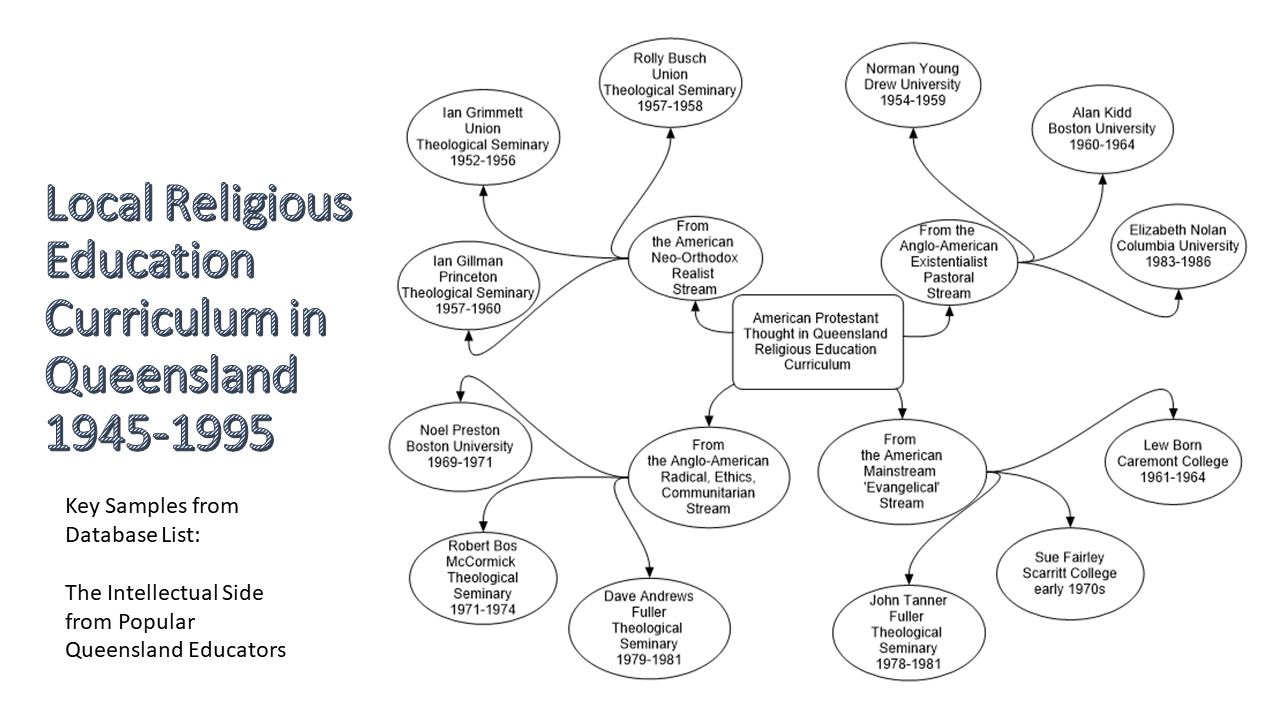
There is urgency in providing education which will defuse the explosive confusion of popular misconceptions in the history of ‘religious’/Christian instruction/‘education’.[1] Education policy makers and the general public have not caught up with the trend in higher education scholarship, and are still thinking in the outdated models of the academic discipline. If we take the last four decades as being the era of the fourth school of philosophical skepticism, there have been three previous academic schools of thought that shaped religious/Christian education: that which focused on a general theory of religion; focused on phenomenology; and focused on cultural pluralism.
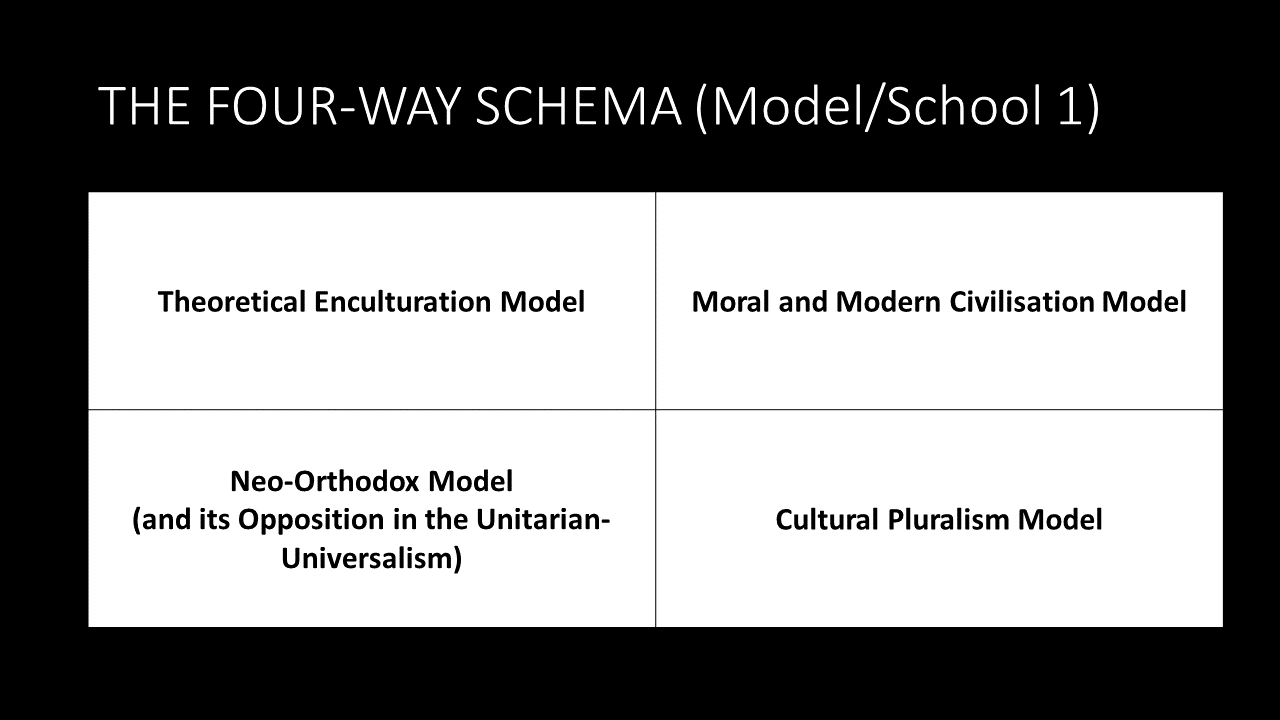
These four-way schemas are being applied in research for a book to provide the Queensland case study. This is an important and urgent analysis since the characterisation of Queensland reinforces the retrograde national narrative for outdated models of church-state relations, and will continue to do so, unless better education for faith and belief is provided. This paper will mark out the Queensland historical players and events on the pathway that shifted back and forth between religious instruction, Christian education, and religious education.
The collapse of ‘orthodoxy’ and the rise of nuanced pluralist models in monist frameworks.
At a local and regional level, as in my research on Queensland intellectual paradigms, neo-orthodoxy is translated, and can be translated, into nuanced frameworks during particular time periods, based on who lived in that local society at the time and the global waves of reading and dialogues (often overlapping):
- Colonial Period
Anti-Erastian Christianity
British Classical Education
Christian Biblicalist Education
Christian Broad-Curriculum Education
Christian Church Education
Christian Classical Education
Christian Conservative Education
Christian Secular Education
Christian Secular Modernist Education
Literary Austra-European (Colonial-Patriotic) Intellectual Education
Pre-Vatican I Catholic Education
- Federation Period
Recap: Colonial Literary Folk Education
British Classical Education
Christian Biblicalist Education
Christian Classical Education
Christian Conservative Broad-Curriculum Education
Efficient Broad-Curriculum Education
International Laborite Education
Irish Loyalist Catholic Education
Liberal-Left Evangelical Education
Vatican I Catholic Education
- Nation-Building Period
Adult and Community Education
Christian Biblicalist Education
Christian Broad-Curriculum Education
Christian Classical Education
Christian Conservative Modernist Education
Christian Modernist Education
Christian Secular Education
Conservative-Liberal Evangelical Education
Egalitarian Utilitarian Agrarian-valued Education
Irish Loyalist Catholic Education
Liberal-Left Evangelical Education
Literary Folk Education
Megachurch Prosperity Gospel Education
Modernist Social Work Education
Post-Idealist Christian Modernist Education
- Period of Mid-Century Neo-Orthodoxy and Heresy
Broad-Curriculum Education
Charismatic Christianity
Christian Broad-Curriculum Education
Christian Conservative Broad-Curriculum Education
Christian Conservative Modernist Education
Christian Modernist Liberal Education
Christian Modernist Social Work Education
Christian Secular Modernist Education
Confucianism (‘foreign’ integrated/appropriated syncretic)
Conservative Evangelical Education
Conservative-Liberal Evangelical Education
Conservative-Liberal Evangelical Indigenous Education
Diagnosis and Remedial Education
Domestic Technical Education
Educational Psychology
Fundamentalist Christianity (Creationism)
Liberal-Left Evangelical Education
Literary Modern Education
Megachurch Prosperity Gospel Education
Modernist Liberal Indigenous Education
Progress Philosophy
Renegade Laborite Education
Traditional Reformed Theology Education
- The Late Modern Period
Charismatic Christianity
Christian Conservative Broad-Curriculum Education
Christian Evangelical Skeptical Education
Christian Modernist Social Work Education
Christian Modernist-Postmodernist Liberal Education
Christian Multiculturalism and Religionist Historiography
Conservative Evangelical Education
Conservative-Liberal Evangelical Education
Conservative-Liberal Evangelical Indigenous Education
Fundamentalist Christianity (Creationism)
Liberal-Left Evangelical Education
Megachurch Prosperity Gospel Education
- The New Century
Christian Modernist Liberal Education
Christian Modernist-Postmodernist Liberal Education
Conservative-Liberal Evangelical Education
Modernist Social Work Education
Traditional Reformed Theology Education
The continual reinvention of orthodox belief was a key part of the frameworks.[2] Together, it works, not as a singular belief system, but as Randall Collins’ The Sociology of Philosophies: A Global Theory of Intellectual Change model for charting relationships of cultural and social transmissions (e.g., ‘Queensland Intellectual Scatterplot Matrix’). The historiographical model is an explanation of the global-local layering, and in my research specifically to:
- Theological Education;
- Church Education Programs; and
- Christian schooling.
On a global scale Collins (1998) argues that cultural and social transmissions happen as networks of scholars, in different types of relationships, and often beyond boundaries of the instituted ‘schools’. The traditional ‘schools’ outlook leads into the critique of Ivan Illich (1970) for “Deschooling Society”. Schools lack the capacity of correcting for the inadequacies for established and personal worldviews. With the movements of transnational histories and the dynamics of global-regional-local relations, we can see how the Queensland intellectual and educational environment was reshaped by scholars between the University of Queensland, Griffith University, and the rest of the educated society.
REFERENCES IN THE PRIMARY SOURCE RESOURCE AND BIBLIOGRAPHY ON THE TOPIC
Ackerman, J. M. (1991). Reading, Writing, and Knowing: The Role of Disciplinary Knowledge in Comprehension and Composing. Research in the Teaching of English, 25(2), 133–178. http://www.jstor.org/stable/40171186
Adam, R. (2008). Relating Faith Development and Religious Styles: Reflections in Light of Apostasy from Religious Fundamentalism. Archiv Für Religionspsychologie / Archive for the Psychology of Religion, 30, 201-231. Retrieved April 29, 2020, from www.jstor.org/stable/23907899
Alford, R. (1961). Catholicism and Australian Politics: A Case Study of ‘Third Parties’ and Political Change. Berkeley Journal of Sociology, 6(1), 15-33. Retrieved April 29, 2020, from www.jstor.org/stable/42888980
Almond, P. (1983). Wilfred Cantwell Smith as Theologian of Religions. The Harvard Theological Review, 76(3), 335-342. Retrieved April 29, 2020, from www.jstor.org/stable/1509527
Almond, Philip C. & Woolcock, P. G. (1978). Dissent in Paradise : Religious Education Controversies in South Australia. Magill, S.A : Murray Park College of Advanced Education
Andrews, D. (1996). Case study in holistic mission No. 20: And now for the Good News from the “Waiters’ Union”. Transformation,13(3), 17-21. Retrieved April 29, 2020, from www.jstor.org/stable/43054943
Arcus, M. E. (1980). Value Reasoning: An Approach to Values Education. Family Relations, 29(2), 163–171. https://doi.org/10.2307/584067
Ata, A., & Windle, J. (2007). The Role of Australian Schools in Educating Students about Islam and Muslims. AQ: Australian Quarterly, 79(6), 19-40. Retrieved April 29, 2020, from www.jstor.org/stable/20638519
Badger, C.R. (1971). The Reverend Charles Strong and the Australian Church, Melbourne, Charles Strong Memorial Trust
Bagood, A. (2010). Complexity System and Our Catholic Faith. Angelicum, 87(1), 177-202. Retrieved May 8, 2020, from www.jstor.org/stable/44616488
Baker, L., et al (2001). Soul, Body, and Survival: Essays on the Metaphysics of Human Persons (Corcoran K., Ed.). Ithaca; London: Cornell University Press. Retrieved May 8, 2020, from www.jstor.org/stable/10.7591/j.ctv3s8s32
Barcan, A. (1990). The Control of Schools and the Curriculum. The Australian Quarterly, 62(2), 170-177. doi:10.2307/20635582
Barcan, A. (2007). Whatever Happened to Adult Education? AQ: Australian Quarterly, 79(2), 29-40. Retrieved April 29, 2020, from www.jstor.org/stable/20638464
Belzil, C., & Leonardi, M. (2013). Risk Aversion and Schooling Decisions. Annals of Economics and Statistics, (111/112), 35-70. doi:10.2307/23646326
Berger, Peter L (1973). The Social Reality of Religion, Harmondsworth, Penguin.
Berger, Peter L. (1998). ‘Protestantism and the quest for certainty’, The Christian Century, 115 (23), 782–796.
Black, A. (1985). The Impact of Theological Orientation and of Breadth of Perspective on Church Members’ Attitudes and Behaviors: Roof, Mol and Kaill Revisited. Journal for the Scientific Study of Religion, 24(1), 87-100. doi:10.2307/1386277
Bouma, Gary (2007). Australian Soul : Religion and Spirituality in the 21st Century, Cambridge University Press
Bowler, Kate, and Wen Reagan (2014). ‘Bigger, Better, Louder: The Prosperity Gospel’s Impact on Contemporary Christian Worship,’ Religion and American Culture: A Journal of Interpretation, vol. 24, no. 2, pp. 186–230.
Brennan, Damien & Barry, Graeme (1997). A syllabus for religious education for Catholic schools : Brisbane Archdiocese : years 1 to 12. Brisbane Catholic Education.
Brennan, Damien & Barry, Graeme (1997). Religious education : a curriculum profile for catholic schools. Brisbane Catholic Education.
Brown, David (2006). Richard Hofstadter: An Intellectual Biography, University of Chicago Press
Bruner, Jerome S. (1977). The Process of Education, Cambridge: Harvard University Press,
Bruno-Jofré, Rosa (2022). Ivan Illich Fifty Years Later: Situating Deschooling Society in His Intellectual and Personal Journey, University of Toronto Press
Buch, Neville (1995). ‘Americanizing Queensland Protestantism’, Studying Australian Christianity 1995 Conference, Robert Menzies College, Macquarie University, July.
Buch, Neville (1995). The Significance of the American Invasion for Australian Churches: A Preliminary Examination, War’s End Conference (Queensland Studies Centre, Griffith University), University Hall, James Cook University, July.
Buch, Neville (1997). ‘‘…many distractions confronting the Church’: The Responses of Protestant Religion to Popular Culture in Queensland 1919-1969,’ Everyday Wonders Popular Culture: Past and Present’, 10th International Conference, Crest Hotel, Brisbane, June.
Buch, Neville (2007). Religion Remain a Problem. The Skeptic. Summer.
Buckley Jr., William F. (1951). God and Man at Yale: The Superstitions of “Academic Freedom”, Washington, D.C: Regnery Publishing.
Burritt, A. (2022). Jesus in Schools: The Education (Religious Instruction) Act 1950. Journal for the Academic Study of Religion, 35(1), 94–111. https://doi.org/10.1558/jasr.22394
Carson, D.A. (2008). Christ and Culture Revisited, Grand Rapids: William B. Eerdmans Publishing Company
Chant, Barry (1984; revised edition). Heart of Fire: The Story of Australian Pentecostalism, Unley Park: House of Tabor.
Chant, Barry (1999), ‘The spirit of Pentecost: Origins and development of the Pentecostal movement in Australia, 1870–1939’, PhD thesis, Macquarie University.
Chant, Barry (2006). The Hallowed Touch: A Reflection on the Assembly of God Church, North Queensland, 1924-1949, Australasian Pentecostal Studies, 9, webpage
Chant, Barry (2011). The Spirit of Pentecost: The Origins and Development of the Pentecostal Movement in Australia, 1870-1939, Emeth Press.
Chappell, D. (2004). Prophetic Christian Realism and the 1960s Generation. In A Stone of Hope: Prophetic Religion and the Death of Jim Crow (pp. 67-86). University of North Carolina Press. Retrieved May 22, 2020, from www.jstor.org/stable/10.5149/9780807895573_chappell.7
Chilton, Hugh (2019). Evangelicals and the End of Christendom: Religion, Australia and the Crises of the 1960s, Routledge.
Clark, William (2006). Academic Charisma and the Origins of the Research University, University of Chicago Press
Clifton, Shane (2009). Pentecostalism and the Age of Interpretation: A Response, Australasian Pentecostal Studies, Issue 11. Retrieved from https://aps-journal.com/index.php/APS/article/view/96
Clifton, Shane J. (2005). An analysis of the developing ecclesiology of the Assemblies of God in Australia, PhD thesis, Australian Catholic University.
Collins, Randall (1998). The Sociology of Philosophies: A Global Theory of Intellectual Change, Harvard University Press.
Connell, W.F.. 1980. A History of Education in the Twentieth Century World. Canberra.
Crook, Paul (2017). Intellectuals and the Decline of Religion: Essays and Reviews, Brisbane: Boolarong Press
Crown, A. (1977). The Initiatives and Influences in the Development of Australian Zionism, 1850-1948. Jewish Social Studies, 39(4), 299-322. Retrieved April 28, 2020, from www.jstor.org/stable/4466971
Curthoys, Ann (1991) Teaching applied history, Australian Historical Studies, 24:96, 192-197, DOI: 10.1080/10314619108595880
Davis, Glyn (2017). The Australian Idea of a University, Melbourne University Press
Davison, Graeme (1988) The Use and Abuse of Australian History, Australian Historical Studies, 23:91, 55-76, DOI: 10.1080/10314618808595790
Dayton, D. (1988). Pentecostal/Charismatic Renewal And Social Change: A Western Perspective. Transformation, 5(4), 7-13. Retrieved May 9, 2020, from www.jstor.org/stable/43053010
De Souza, M. (2014). Religious Identity and Plurality amongst Australian Catholics: Inclusions, Exclusions and Tensions. Journal for the Study of Religion, 27(1), 210-233. Retrieved May 6, 2020, from www.jstor.org/stable/24798877
Del Nevo, Matthew (2007). Pentecostalism and the Three Ages of the Church, Australasian Pentecostal Studies, Issue 10. Retrieved from https://aps-journal.com/index.php/APS/article/view/23
Dening, G. M. (1973) History as a social system, Historical Studies, 15:61, 673-685, DOI: 10.1080/10314617308595498
Deverell, Garry Worete (2018). Theology : A Trawloolway man reflects on Christian Faith, Morning Star Publishing
Dewey, John (1934, 2013). A Common Faith, Yale University Press, New Haven, Conn.
Dewey, John (1909). Moral Principles in Education, Boston : Houghton Mifflin
Dewey, John (1916). Democracy and Education: An Introduction to the Philosophy of Education, London: Macmillan and Co. Limited.
Dewey, John (1938). Experience and Education, New York: Simon and Schuster.
Dulles, Avery (1988). Models of the church (2nd ed). Dublin: Gill and Macmillan,
Dux, Monica (2021). Lapsed: Losing Your Religion is Harder Than it Looks, ABC Books
Emison, Mary (2013). Degrees for a New Generation: Marking the Melbourne Model, University of Melbourne Press
Erb, F. (1916). The Development of the Young People’s Movement. The Biblical World, 48(3), 129-192. Retrieved May 6, 2020, from www.jstor.org/stable/3142079
Erdozain, Dominic (2016). The soul of Doubt : the religious roots of unbelief from Luther to Marx. Oxford University Press
Evers, Colin and Gabriele Kakomski (2022). Why Context Matters in Educational Leadership: A New Theoretical Understanding, Routledge, Abingdon, Oxan, UK.
Fitzgerald, Timothy (2000). The Ideology of Religious Studies, Oxford University Press.
Fitzgerald, Timothy (2007). Discourse on Civility and Barbarity : a critical history of religion and related categories. Oxford University Press, Oxford
Fogarty, Stephen (2011). The Dark Side of Charismatic Leadership, Australasian Pentecostal Studies, 13, webpage
Freire, Paulo. (1970a). Cultural Action and Conscientization, Harvard Education Review 40, (3), 452-477.
Freire, Paulo. (1970b). Pedagogy of the Oppressed, New York: Seabury Press.
Freire, Paulo. (1972b). A letter to a theology student, Catholic Mind, 70, 1265.
Freire, Paulo. (1973). Education for Critical Consciousness, New York: Seabury Press.
Freire, Paulo. (1975). Conscientization, Geneva: World Council of Churches.
Freire, Paulo. (1976). Education, the Practice of Freedom, London: Writers and Readers Publishing Cooperative.
Freire, Paulo. (1985). The Politics of Education: Culture, Power and Liberation, South Hadley: Bergin & Garvey.
Freire, Paulo. (1994). Pedagogy of Hope: Reliving Pedagogy of the Oppressed, New York: Continuum.
Freire, Paulo. (1998b). Politics and Education, Los Angeles: UCLA Latin American Center Publications.
French, E. (1965). The Australian Tradition in Secondary Education 1814-1900. Comparative Education, 1(2), 89-103. Retrieved April 28, 2020, from www.jstor.org/stable/3098340
Friesen, G., & Taksa, L. (1996). Workers’ Education in Australia and Canada: A Comparative Approach to Labour’s Cultural History. Labour History, (71), 170-197. doi:10.2307/27516453
Ganter, R. (2018). Engaging with missionaries. In The Contest for Aboriginal Souls: European missionary agendas in Australia (pp. 107-146). Australia: ANU Press. Retrieved May 6, 2020, from www.jstor.org/stable/j.ctv301dv4.9
Ganter, R. (2018). Protestants divided. In The Contest for Aboriginal Souls: European missionary agendas in Australia (pp. 23-48). Australia: ANU Press. Retrieved May 6, 2020, from www.jstor.org/stable/j.ctv301dv4.6
Garrison, J. (1995). Deweyan Pragmatism and the Epistemology of Contemporary Social Constructivism, American Educational Research Journal, 32(4), 716-740.
Gilbert, Bennett (2020). A Personalist Philosophy of History, Routledge
Giroux, Henry (1983, co-edited with David E. Purpel). The Hidden Curriculum and Moral Education: Deception or Discovery? Berkeley: McCutchan.
Giroux, Henry and Stanley Aronowitz (1985). Education Under Siege: The Conservative, Liberal, and Radical Debate Over Schooling, Westport: Bergin and Garvey Press.
Giroux, Henry and Stanley Aronowitz (1991). Postmodern Education: Politics, Culture, and Social Criticism, Minneapolis, MN: University of Minnesota Press.
Goldburg, P. (2008). Teaching Religion in Australian Schools. Numen, 55(2/3), 241-271. Retrieved April 29, 2020, from www.jstor.org/stable/27643310
Gough, Austin (1962) Catholics and the free society, Historical Studies: Australia and New Zealand, 10:39, 370-378, DOI: 10.1080/10314616208595243
Gowers, Ann & Scott, Roger. 1979. Fundamentals and fundamentalists : a case-study of education and policy-making in Queensland. Australasian Political Studies Association, Bedford Park, S.A.
Graeber, David (2018). Bullshit jobs (First Simon & Schuster hardcover edition). Simon & Schuster, New York
Grey, Jacqueline (2002). Torn Stockings and Enculturation: Women Pastors in the Australian Assemblies of God, Australasian Pentecostal Studies, Issue 5/6. Retrieved from https://aps-journal.com/index.php/APS/article/view/51
Gwenda Tavan (1997) ‘Good neighbours’: Community organisations, migrant assimilation and Australian society and culture, 1950–1961, Australian Historical Studies, 27:109, 77-89, DOI: 10.1080/10314619708596044
Hally, C. (1960). Student Formation in Australia. The Furrow,11(10), 662-666. Retrieved May 6, 2020, from www.jstor.org/stable/27657937
Handy, Robert T. (1976). A History of the Churches in the United States and Canada, Oxford at the Clarendon Press.
Handy, Robert T. (1977). A Christian America: Protestant Hopes and Historical Realities, New York. Oxford University Press.
Hannah-Jones, A. (2003). Competing Claims for Justice: Sexuality and Race at the Eighth Assembly of the Uniting Church in Australia, 1997. Journal of the History of Sexuality, 12(2), 277-304. Retrieved April 28, 2020, from www.jstor.org/stable/3704615
Hans, N. (1939). History of Education in the British Commonwealth of Nations. Review of Educational Research,9(4), 361-367. Retrieved April 28, 2020, from www.jstor.org/stable/1167565
Harris, F. (2007). Dewey’s Concepts of Stability and Precariousness in His Philosophy of Education, Education and Culture, 23(1), 38-54.
Harrison, John. (2006). The Religious Culture of Queensland: Pietism in Religious Practice, Congregationalism in Ecclesiastical Polity. Ph.D. thesis, University of Queensland.
Hayot, Eric (2021). Humanist Reason: A History, An Argument, A Plan, Columbia University Press
Hedges, Paul Michael (2021). Understanding Religion: Theories and Methods for Studying Religiously Diverse Societies, University of California Press
Hey, Sam (2011). God in the Suburbs and Beyond: The Emergence of an Australian Megachurch and Denomination. Ph.D thesis, School of Humanities, Griffith University.
Hey, Sam and Geoff Waugh (2016). Megachurches: Origins, Ministry and Prospects. Morning Star Publishing.
Higgins, Jackie (1998, 2022). Sister Girl: Reflections on Tiddalism, Identity and Reconciliation, University of Queensland Press
Hilliard, David (1991) God in the suburbs: The religious culture of Australian cities in the 1950s, Australian Historical Studies, 24:97, 399-419, DOI: 10.1080/10314619108595856
Hilliard, David (1997) Church, family and sexuality in Australia in the 1950s, Australian Historical Studies, 27:109, 133-146, DOI: 10.1080/10314619708596048
Hoffer, Eric (2002). The True Believer : thoughts on the nature of mass movements (First Perennial Modern Classics edition). Harper Perennial Modern Classics, New York
Hogan, M. (1979). Australian Secularists: The Disavowal of Denominational Allegiance. Journal for the Scientific Study of Religion, 18(4), 390-404. doi:10.2307/1386363
Horne, Donald (2022). The Education of Young Donald Horne Trilogy, NewSouth Publishing
Howe, Brian & Hughes, Philip, et al. (2003). Spirit of Australia II : religion in citizenship and national life. ATF Press, Hindmarsh, SA
Hudson, Wayne (2016). Australian religious thought. Monash University Publishing, Clayton, Victoria
Hughes, Philip (1996). The Pentecostals in Australia, Australian Government Publishing Service, Canberra, ACT.
Hutch, R. (1987). Biography, Individuality and the Study of Religion. Religious Studies, 23(4), 509-522. Retrieved April 29, 2020, from www.jstor.org/stable/20019245
Hutchinson, Mark (1999). The New Thing God is Doing: The Charismatic Renewal and Classical Pentecostalism, Australasian Pentecostal Studies, 1, webpage
Hutchinson, Mark (2017). Australasian Charismatic Movements and the “New Reformation of the 20th Century?” Australasian Pentecostal Studies, Issue 19.
Illich, Ivan (1971). Deschooling Society. London: Calder & Boyars.
Illich, Ivan (1973). Tools for Conviviality. New York: Harper & Row.
Illich, Ivan (1974). Energy and Equity. London: Calder & Boyars.
Illich, Ivan , et al (edited,1977). Disabling Professions, New York Marion Boyars
Jagelman, Ian (1999). Church Growth: Its Promise and Problems for Australian Pentecostalism, Australasian Pentecostal Studies, Issue 1. Retrieved from https://aps-journal.com/index.php/APS/article/view/46
Jagelman, Ian (1999). Harvey Cox and Pentecostalism: A Review of Fire from Heaven, Australasian Pentecostal Studies, 1,webpage
Jones, Adrian (2011) Teaching History at University through Communities of Inquiry, Australian Historical Studies, 42:2, 168-193, DOI: 10.1080/1031461X.2010.531747
Jordan, Trevor L. (2007). Scapegoating Girard: Violence and the future of religion. St Mark’s Review, (202), 31-38.
Jordan, Trevor. (1992). Ethical education after Fitzgerald: return to a golden past or the end of civilisation as we know it? Social Alternatives, 11(3)
Jordan, Trevor. (1998). Studies in Religion as a Profession. Australian Religion Studies Review. 11(2)
- S. Inglis (1958) Catholic historiography in Australia, Historical Studies: Australia and New Zealand, 8:31, 233-253, DOI: 10.1080/10314615808595120
KIRK, G. (2015). The Shortcomings of Abstraction (1871–2017). In The Pedagogy of Wisdom: An Interpretation of Plato’s Theaetetus (pp. 155-196). Evanston, Illinois: Northwestern University Press. Retrieved May 7, 2020, from www.jstor.org/stable/j.ctv47wcf7.9
Kohn, Rachael (2003). The New Believers: Re-Imagining God, Harper Collins
Labaree, D. F. (1997). Public Goods, Private Goods: The American Struggle over Educational Goals. American Educational Research Journal, 34(1), 39–81. https://doi.org/10.2307/1163342
Lattke, M. (1985). Rudolf Bultmann on Rudolf Otto. The Harvard Theological Review, 78(3/4), 353-360. Retrieved April 29, 2020, from www.jstor.org/stable/1509695
Lawry, J. (1967). The Development of a National System of Education in New South Wales. History of Education Quarterly,7(3), 349-356. doi:10.2307/367177
Lecompte, M. D. (2014). Collisions of culture: Academic culture in the neoliberal university. Learning and Teaching: The International Journal of Higher Education in the Social Sciences, 7(1), 57–78. http://www.jstor.org/stable/24717955
Leigh Boucher & Michelle Arrow (2016) ‘Studying Modern History gives me the chance to say what I think’: learning and teaching history in the age of student-centred learning, History Australia, 13:4, 592-607, DOI: 10.1080/14490854.2016.1249274
Loos, N. (1991). From Church to State: The Queensland Government Take-Over of Anglican Missions In North Queensland. Aboriginal History, 15(1/2), 73-85. Retrieved April 28, 2020, from www.jstor.org/stable/24046403
Macintyre, Stuart (2009) The Poor Relation: Establishing the Social Sciences in Australia, 1940–1970, Australian Historical Studies, 40:1, 47-62, DOI: 10.1080/10314610802663019
Macklin, Michael (1972). To Deschool Society, Cold Comfort, December 1972.
Macklin, Michael (1975). Those Misconceptions are not Illich’s, Educational Theory, 25 (3), 323-329
Macklin, Michael (1976). When Schools are Gone: A Projection of the Thought of Ivan Illich, St. Lucia: University of Queensland Press.
Maddox, Marion (2001). For God and Country: Religious Dynamics in Australian Federal Politics, Canberra: Parliament of Australia
Maddox, Marion (2005). God Under Howard: The Rise of The Religious Right in Australian Politics, Sydney: Allen & Unwin
Maddox, Marion (2014). Taking God to School: The End of Australia’s Egalitarian Education, Allen & Unwin
Malcolm Vick (1992) Community, state and the provision of schools in mid‐nineteenth century South Australia, Australian Historical Studies, 25:98, 53-71, DOI: 10.1080/10314619208595893
Marginson, S. (1997). Imagining Ivy: Pitfalls in the Privatization of Higher Education in Australia. Comparative Education Review, 41(4), 460-480. Retrieved April 28, 2020, from www.jstor.org/stable/1189004
Marginson, Simon (2016). Higher Education and the Common Good. Melbourne University Publishing
Marsden, George M. (1987). Reforming Fundamentalism. Fuller Seminary and the New Evangelicalism, Grand Rapids: William B. Eermanns Publishing Company.
Marsden, W. E. (2000). Geography and Two Centuries of Education for Peace and International Understanding. Geography, 85(4), 289–302. http://www.jstor.org/stable/40573474
Marti, Gerardo (2020). American Blindspot: Race, Class, Religion, and the Trump Presidency, London: Rowman & Littlefield.
Marty, Martin E. (1970). Righteous Empire. The Protestant Experience, New York:The Dial Press.
Mavor, Ian. 1977. Religious education : its nature and aims : a statement of principles underlying the development work of the Religious Education Curriculum Project. Queensland. Dept. of Education. Religious Education Curriculum Project. Select
MAYRL, D. (2011). Administenng Secularization: Religious Education in New South Wales since 1960. European Journal of Sociology / Archives Européennes De Sociologie / Europäisches Archiv Für Soziologie, 52(1), 111-142. Retrieved April 29, 2020, from www.jstor.org/stable/43282174
McCutcheon, Russell T (1997). Manufacturing Religion : the discourse on sui generis religion and the politics of nostalgia. Oxford University Press, New York
McCutcheon, Russell T. (2014). Entanglements: Marking Place in the Field of Religion, Equinox Publishing.
McDonagh, S. (2006). The Australian Church and Climate Change. The Furrow, 57(1), 48-53. Retrieved April 29, 2020, from www.jstor.org/stable/27665281
McLoughlin, William G. (1987). Revivals, Awakenings and Reform: An Essay on Religion and Social Change in America 1607-1977, The University of Chicago Press.
Mead, Sidney E. (1975). The Nation with the Soul of a Church, New York: Harper and Row.
Meyer, C. (2000). “What a Terrible Thing It Is to Entrust One’s Children to Such Heathen Teachers”: State and Church Relations Illustrated in the Early Lutheran Schools of Victoria, Australia. History of Education Quarterly, 40(3), 302-319. doi:10.2307/369555
Miller, R. (1939). Is Temple a Realist? The Journal of Religion,19(1), 44-54. Retrieved May 7, 2020, from www.jstor.org/stable/1197939
Mol, H. (1974). The Sacralization of the Family With Special Reference to Australia. Journal of Comparative Family Studies, 5(2), 98-108. Retrieved April 29, 2020, from www.jstor.org/stable/41600888
Mol, J. (1969). Rites of Passage in Australia. The Australian Quarterly, 41(3), 64-74. doi:10.2307/20634302
Montessori, Maria (1914). Dr. Montessori’s Own Handbook, New York: Frederick A. Stokes Company.
Montessori, Maria (1949). The Absorbent Mind, Madras: Theosophical Publishing House.
Montessori, Maria (Translated by Anne E. George,1912). The Montessori Method: Scientific Pedagogy as Applied to Child Education in ‘The Childhood Houses’ with Additions and Revisions by the Author, New York: Frederick A. Stokes Company.
Montessori, Maria (Translated by Barbara B. Carter, 1936). The Secret of Childhood, New York: Longmans, Green & Co. Inc.
Montessori, Maria (Translated by Mary A. Johnstone, 1948). The Discovery of the Child, Madras: Kalakshetra Publications Press.
Mulder, Mark & Marti, Gerardo. (2020). The Glass Church: Robert H. Schuller, the Crystal Cathedral, and the Strain of Megachurch Ministry, Rutgers University Press
Murphy, Kate (2015) ‘In the Backblocks of Capitalism’: Australian Student Activism in the Global 1960s, Australian Historical Studies, 46:2, 252-268, DOI: 10.1080/1031461X.2015.1039554
Murray, Iain H. (1988) Australian Christian Life From 1788: An Introduction and an Anthology, Edinburgh: The Banner of Truth Trust.
Myers, Benjamin (2012). Christ the Stranger: The Theology of Rowan Williams, t & t Clark.
Nethersole, Reingard (2015). Twilight of the Humanities: Rethinking (Post)Humanism with J.M. Coetzee. Symplokē, 23(1-2), 57-73. doi:10.5250/symploke.23.1-2.0057
Niebuhr, Reinhold (1932). Moral Man and Immoral Society: A Study in Ethics and Politics, Charles Scriber’s Sons [Rev. Ed. Westminster John Knox, 2001].
Niebuhr, Richard (1937). The Kingdom of God in America
Niebuhr, Richard (1951). Christ and Culture, New York: Harper and Brothers Publishers
Niebuhr, Richard (1963). The Responsible Self : An Essay in Christian Moral Philosophy
Noddings, Nel (2013). Education and Democracy in the 21st Century, Teachers’ College Press
Noddings, Nel (1984). Caring: A Feminine Approach to Ethics and Moral Education, Berkeley: University of California Press.
Noddings, Nel (1996). Stories and Affect in Teacher Education, Cambridge Journal of Education, 26 (3).
Noddings, Nel (1999). Justice and Caring: The Search for Common Ground in Education, Teachers College Press, New York.
Noddings, Nel (2005). Identifying and Responding to needs in Teacher Education, Cambridge Journal of Education, 35 (2).
Noddings, Nel (2005). What does it mean to Educate the WHOLE child? Educational Leadership, 63 (1).
Noel Pearson (2021). Mission: Essays, Speeches & Ideas, Black Inc.
Nolan, Carolyn & Stuartholme Convent of the Sacred Heart (Brisbane, Qld.) (1995). Ribbons, beads and processions : the foundation of Stuartholme. Stuartholme Parents and Friends Association, Toowong, Qld
Nuyen, A. (2001). Realism, Anti-Realism, and Emmanuel Levinas. The Journal of Religion, 81(3), 394-409. Retrieved April 29, 2020, from www.jstor.org/stable/1206402
Nye, Adele, and Marnie Hughes-Warrington, Jill Roe, Penny Russell, Mark Peel, Desley Deacon, Amanda Laugeson & Paul Kiem (2009). Historical Thinking in Higher Education, History Australia, 6:3, 73.1-73.16, DOI: 10.2104/ha090073
O’Brien, Anne (1993) ‘A church full of men’: Masculinism and the church in Australian history, Australian Historical Studies, 25:100, 437-457, DOI: 10.1080/10314619308595925
O’Brien, Anne (1996) The case of the ‘cultivated man’: Class, gender and the church of the establishment in interwar Australia, Australian Historical Studies, 27:107, 242-256, DOI: 10.1080/10314619608596012
O’Brien, Anne (1997) Sins of Omission? Women in the history of Australian religion and religion in the history of Australian women. A reply to Roger Thompson, Australian Historical Studies, 27:108, 126-133, DOI: 10.1080/10314619708596032
O’Brien, Anne (2002) Historical overview spirituality and work Sydney women, 1920–1960, Australian Historical Studies, 33:120, 373-388, DOI: 10.1080/10314610208596226
O’Farrell, Patrick (1977) Historians and religious convictions, Historical Studies, 17:68, 279-298, DOI: 10.1080/10314617708595552
Ono, A. (2012). You gotta throw away culture once you become Christian: How ‘culture’ is Redefined among Aboriginal Pentecostal Christians in Rural New South Wales. Oceania, 82(1), 74-85. Retrieved April 27, 2020, from www.jstor.org/stable/23209618
Osborn, D. (2010). CHAPTER THREE: Resisting the State: Christian Fundamentalism and A Beka. Counterpoints, 376, 35-45. Retrieved April 28, 2020, from www.jstor.org/stable/42980731
Otto, R., & Almond, P. (1984). Buddhism and Christianity: Compared and Contrasted. Buddhist-Christian Studies, 4, 87-101. doi:10.2307/1389938
Pals, Daniel (2022). Ten Theories of Religion, Oxford University Press.
Perry, B. (2011). Universities and Cities: Governance, Institutions and Mediation. Built Environment (1978-), 37(3), 244–259. http://www.jstor.org/stable/23290044
Petersen, D. (1999). Missions in the twenty-first century: Toward a methodology of Pentecostal compassion. Transformation, 16(2), 54-59. Retrieved May 9, 2020, from www.jstor.org/stable/43053095
Phillips, R. (1978). John Dewey Visits the Ghetto. The Journal of Negro Education, 47(4), 355-362. doi:10.2307/2295000
Phillips, Walter (1981). Defending “a Christian country” : churchmen and society in New South Wales in the 1880s and after. University of Queensland Press, St. Lucia, Qld
Piaget, Jean (1953). Logic and Psychology, Manchester: Manchester University Press,
Piaget, Jean (1969). The Mechanisms of Perception, New York: Basic Books.
Piaget, Jean (1977). The Grasp of Consciousness: Action and concept in the young child, London: Routledge and Kegan Paul.
Pietsch, Tamson (2015). Empire of Scholars : Universities, Networks and the British Academic World, 1850-1939. Manchester University Press, Oxford
Piggin, Stuart & Linder, Robert D., (author.) & Scalmer, Sean, (series editor.) & Monash University Publishing, (publisher.) (2018). The Fountain of Public Prosperity : evangelical Christians in Australian history 1740 – 1914. Monash University Publishing, Clayton, Vic
Pizmony-Levy, O. (2011). Bridging the Global and Local in Understanding Curricula Scripts: The Case of Environmental Education. Comparative Education Review, 55(4), 600–633. https://doi.org/10.1086/661632
Rademaker, Laura; Noelani Goodyear-Ka’opua, April K. Henderson (2022). Found in Translation : Many Meanings on a North Australian Mission, University of Hawai’i Press.
Radford, M. (2007). Passion and Intelligibility in Spiritual Education, British Journal of Educational Studies, 55 (1), 21-36.
Riches, Tanya (2010). Next Generation Essay: The Evolving Theological Emphasis of Hillsong Worship (1996–2007), Australasian Pentecostal Studies, Issue 13. Retrieved from https://aps-journal.com/index.php/APS/article/view/108
Ringma, Charles; Chadwick, Remy. (2017). Three Graces for a Word of Truth. The church’s calling in a troubled world: the grand design and fragile engagement. Hawthorn, VIC: Zadok Institute for Christianity and Society.
Rocha, Cristina, Mark P. Hutchinson and Kathleen Openshaw (edited, 2020). Australian Pentecostal and Charismatic Movements: Arguments from the Margins, Leiden: Brill.
Rouse, Joseph (2015). Articulating the World: Conceptual Understanding and the Scientific Image, The University of Chicago Press
Rutland, Suzanne D. (2018) A Celebratory History of Queensland Jewry, History Australia, 15:1, 202-204, DOI: 10.1080/14490854.2018.1416547
Saperstein, D. (2003). Public Accountability and Faith-Based Organizations: A Problem Best Avoided. Harvard Law Review,116(5), 1353-1396. doi:10.2307/1342729
Shay, Marnee and Rhonda Oliver (edited, 2021). Indigenous Education in Australia: Learning and Teaching for Deadly Futures, 1st Edition, Routledge, Abingdon, Oxon, UK.
Sherlock, Peter (2008) ‘Leave it to the Women’ The Exclusion of Women from Anglican Church Government in Australia, Australian Historical Studies, 39:3, 288-304, DOI: 10.1080/10314610802263299
Sherlock, Peter (2018) Book Review: ‘Our Principle of Sex Equality’: The Ordination of Women in the Congregational Church in Australia 1927–1977, Australian Historical Studies, 49:3, 428-429, DOI: 10.1080/1031461X.2018.1495153
Sider, Ronald (1982). Lifestyles in the Eighties. An Evangelical Commitment to Simple Lifestyles, Philadelphia: Westminster Press.
Smith, Jonathan Z. (1982). Imagining Religion: From Babylon to Jonestown, The University of Chicago Press
Smith, Philippa Mein (2018) Locating Australia? How students view Australia’s region, History Australia, 15:2, 216-235, DOI: 10.1080/14490854.2018.1452161
Spearritt, G. (1995). Don Cupitt: Christian Buddhist? Religious Studies, 31(3), 359-373. Retrieved April 29, 2020, from www.jstor.org/stable/20019757
Sperry, William L. (1945). Religion in America, Cambridge University Press.
Stacey, Jeff (2004). Does the Historical Phenomenon of Revival Have a Recognisable ’Pattern’ of Characteristic, Observable Features? Australasian Pentecostal Studies, Issue 8. Retrieved from https://aps-journal.com/index.php/APS/article/view/71
Stanczak, G. (2006). Engaged Spirituality: Social Change and American Religion. New Brunswick, New Jersey; London: Rutgers University Press. Retrieved May 9, 2020, from www.jstor.org/stable/j.ctt5hj8ft
Stark, Rodney and William S. Bainbridge (1987). A Theory of Religion, New York, Peter Lang.
Starr, I. (1954). John Dewey, My Son, and Education for Human Freedom, The School Review, 62 (4), 204-212.
Starr, J. P. (2019). To improve the curriculum, engage the whole system. The Phi Delta Kappan, 100(7), 70–71. https://www.jstor.org/stable/26677377
Stauberg, Michael , Carole M. Cusask, Stuart A. Wright (edited, 2022). The Demise of Religion: How Religions End, Die, or Dissipate, Bloomsbury Publishing PL
Steiner, Rudolf (1907). The Education of the Child, New York: Rudolf Steiner Publications, Inc.
Stevens, Bruce (2006). “Why Feel Bad?” A Theory of Affect and Pentecostal Spirituality, Australasian Pentecostal Studies, 9, webpage
Swain, Shurlee (2005) Do You Want Religion with That? Welfare History in a Secular Age, History Australia, 2:3, 79.1-79.8, DOI: 10.2104/ha050079
Sweet, William Warren (1965). Revivalism in America, Gloucester: Peter Smith.
Szasz, Ferenc Morton (1982). The Divided Mind of Protestant America 1880-1930, Alabama: The University of Alabama Press.
Tacey, David (2000). ReEnchantment: The New Australian Spirituality, Sydney: Harper Collins
Tacey, David (2004). The Spirituality Revolution: The emergence of contemporary spirituality, London: Routledge
Tacey, David (2015). Religion as Metaphor: Beyond Literal Belief, London: Routledge
Tauber, Zvi. (2006). Aesthetic Education for Morality: Schiller and Kant. Journal of Aesthetic Education, 40(3), 22-47. Retrieved April 28, 2020, from www.jstor.org/stable/4140178
Teese, Richard (2000). Academic Success and Social Power: Examinations and Inequality, Melbourne University Press
Thompson, Roger C. (1997) Women and the significance of religion in Australian history, Australian Historical Studies, 27:108, 118-125, DOI: 10.1080/10314619708596031
Tobin, Susan M. (1987). Catholic Education in Queensland. Conference of Catholic Education, Queensland, Brisbane.
Truman, T. (1958). Church And State: The Teaching Of The Catholic Church On Intervention In Politics. The Australian Quarterly, 30(4), 35-43. Retrieved April 29, 2020, from www.jstor.org/stable/20694699
Unnamed. (1975-1979). Catholic education : Policy and Practice. Catholic Education Council (Brisbane, Qld.).
Unnamed. (1983-1987). Religious Education: Teaching Approaches. Department of Education Queensland.
Unnamed. (1984). Religious Education Curriculum Project 1975-1983 : project report. Queensland. Department of Education. Curriculum Branch .
Unnamed. (1986). Religious Education: Teachers Notes – Years. Department of Education Queensland.
Unnamed. (1990). Growing together in faith : religious education content for Years P – 7. Catholic Education Office, Rockhampton, Qld.
Unnamed. (1998). Religious education in state schools : coordinators handbook. Brisbane Catholic Education.
Vondey,Wolfgang (2011).A Review Symposium on: Wolfgang Vondey, Beyond Pentecostalism, Australasian Pentecostal Studies, 13, webpage
Vygotsky, Lev (Russian edition from 1982). The Collected Works of L. S. Vygotsky, Soviet Union, including, Volume 3, Chapter 15: The Historical Meaning of the Crisis in Psychology: A Methodological Investigation (Plenum Press, 1987).
Walker, A. (1961). The Church in the New Australia. The Australian Quarterly, 33(3), 70-80. doi:10.2307/20633722
Wallis, Jim (1995). The Soul of Politics: Beyond “Religious Right” and “Secular Left”, Harcourt Brace.
Walter Phillips (1971) Australian Catholic historiography: Some recent issues, Historical Studies, 14:56, 600-611, DOI: 10.1080/10314617108595446
Warhurst, J. (1976). United States’ Government Assistance to the Catholic Social Studies Movement, 1953-4. Labour History, (30), 38-41. doi:10.2307/27508215
Warhurst, J. (2012). Religion and the 2010 Election: Elephants in the room. In Simms M. & Wanna J. (Eds.), Julia 2010: The caretaker election (pp. 303-312). ANU Press. Retrieved May 6, 2020, from www.jstor.org/stable/j.ctt24h9hm.30
Weber, B. (2011). Design and its discontents. Synthese, 178(2), 271-289. Retrieved May 8, 2020, from www.jstor.org/stable/41477275
Weiler, Peter T. (2000). Pentecostal Postmodernity? An Unexpected Application of Grenz’s Primer on Postmodernism, Australasian Pentecostal Studies, 2/3, webpage
Werpehowski, William (2002). American Protestant Ethics and the Legacy of H. Richard Niebuhr, Georgetown University Press
Wieneke, Peter, Phillips, Ian. 1979. Study of Christianity : Religious Education Curriculum for Years 11, 12. Villanova College. Select
Wild, M. (2015). Liberal Protestants and Urban Renewal. Religion and American Culture: A Journal of Interpretation, 25(1), 110–146. https://doi.org/10.1525/rac.2015.25.1.110
Williams, Stafford. 1986. R.E. lesson plans for secondary schools. Youth Concern Ltd, Gold Coast, Qld. Select
Wuthnow, R. (2004). Public Policy and Civil Society. In Saving America?: Faith-Based Services and the Future of Civil Society (pp. 286-310). Princeton; Oxford: Princeton University Press. doi:10.2307/j.ctt7s2hm.13
Wyatt, T. (2009). The Role of Culture in Culturally Compatible Education. Journal of American Indian Education, 48(3), 47–63. http://www.jstor.org/stable/24398754
ENDNOTES
[1] B.01 Education for Faith & Belief: ‘Education for Faith and Belief’: The Problem of Popular Misconceptions in Queensland, 2022 Australian Historical Association, Geelong, Victoria, Australia, Thursday 30 June 2022.
[2] Historical Sociology of/for Christian/Religious Education in Queensland: Mapping 1859-2022 and Beyond, 2022 Australian Sociological Association Conference (TASA), University of Melbourne, Victoria, Australia, Wednesday 30 November 2022.


